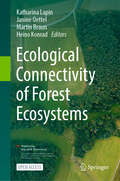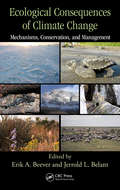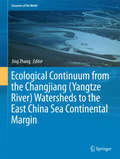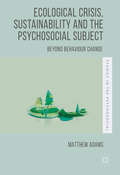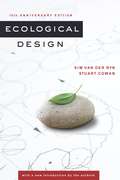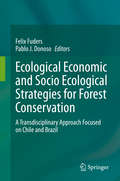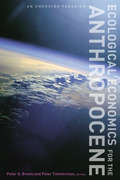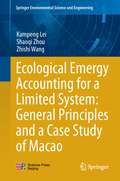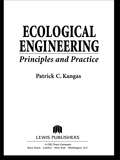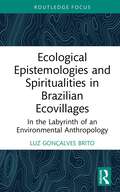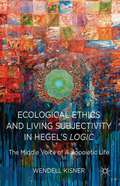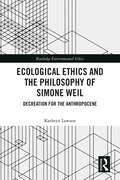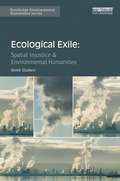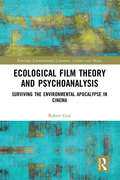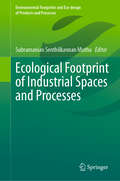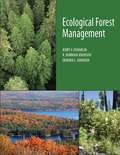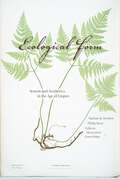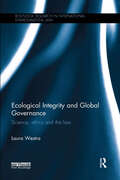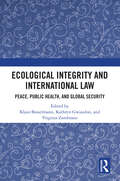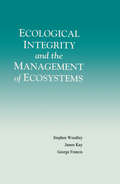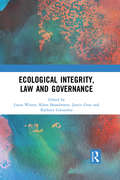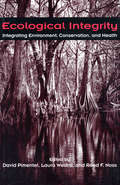- Table View
- List View
Ecological Connectivity of Forest Ecosystems
by Martin Braun Katharina Lapin Janine Oettel Heino KonradThis is an open access book. This professional volume provides scientific background and practical guidance on forest management in light of ecological connectivity. Readers will gain a great understanding of shifting species in response to climate change and the resulting loss of various resources. The main drivers of these variations are the quality of the availability, quantity, and quality of habitats in the landscape, the genetic diversity of species populations, and the ability to navigate through a fragmented landscape matrix. The connectivity of habitats is gaining importance in the combat of both, the biodiversity crisis and the climate change crisis. Improving ecological connectivity, however, does not automatically benefit all species, as the examples described in the book demonstrate. Specific planning tools, active monitoring protocols, and management measures are needed to increase the benefit for species with low dispersal and small population size, which generally fail to migrate. Assisted migration can help to prevent species extinction, but also offer opportunities for pathogens to cross geographical barriers. The vast majority of the known diversity of plants, fungi, vertebrates, and invertebrates depends on forest ecosystems. This volume helps to spread this message and prepare students for their later careers in the forestry sector, while also informing active practitioners and policy makers.
Ecological Consequences of Climate Change: Mechanisms, Conservation, and Management
by Jerome Klosowski Jerrold L. BelantContemporary climate change is a crucial management challenge for wildlife scientists, conservation biologists, and ecologists of the 21st century. Climate fingerprints are being detected and documented in the responses of hundreds of wildlife species and numerous ecosystems around the world. To mitigate and accommodate the influences of climate ch
Ecological Continuum from the Changjiang (Yangtze River) Watersheds to the East China Sea Continental Margin
by Jing ZhangThe book provides a cross-disciplinary and multi-scale assessment of a world top river, the Changjiang (Yangtze River) and its adjacent marginal environment, the East China Sea. The studies in this volume bridges the watersheds of the river and the marginal sea through a combined approach of hydro-dynamics, geochemistry, sedimentary processes, ecology and fishery. The response of ecosystem to the external driving forces is examined via process-oriented observations, mesocosm experiments and numerical simulations in combination. The lessons learnt from the case studies of Changjiang and East China Sea can be beneficial to those who are doing inter-disciplinary researches in the continuum from watersheds to continental margins.
Ecological Crisis, Sustainability and the Psychosocial Subject
by Matthew AdamsThis book draws on recent developments across a range of perspectives including psychoanalysis, narrative studies, social practice theory, posthumanism and trans-species psychology, to establish a radical psychosocial alternative to mainstream understanding of 'environmental problems'. Only by addressing the psychological and social structures maintaining unsustainable societies might we glimpse the possibility of genuinely sustainable future. The challenges posed by the reality of human-caused 'environmental problems' are unprecedented. Understanding how we respond to knowledge of these problems is vital if we are to have a hope of meeting this challenge. Psychology and the social sciences have been drafted in to further this understanding, and inform interventions encouraging sustainable behaviour. However, to date, much of psychology has appeared happy to tinker with individual behaviour change, or encourage minor modifications in the social environment aimed at 'nudging' individual behaviour. As the ecological crisis deepens, it is increasingly recognised that mainstream understandings and interventions are inadequate to the collective threat posed by climate change and related ecological crises.
Ecological Design, Tenth Anniversary Edition: An Ecological Design Retrospective
by Sim Van der Ryn Stuart CowanEcological Design is a landmark volume that helped usher in an exciting new era in green design and sustainability planning. Since its initial publication in 1996, the book has been critically important in sparking dialogue and triggering collaboration across spatial scales and design professions in pursuit of buildings, products, and landscapes with radically decreased environmental impacts. This 10th anniversary edition makes the work available to a new generation of practitioners and thinkers concerned with moving our society onto a more sustainable path. Using examples from architecture, industrial ecology, sustainable agriculture, ecological wastewater treatment, and many other fields, Ecological Design provides a framework for integrating human design with living systems. Drawing on complex systems, ecology, and early examples of green building and design, the book challenges us to go further, creating buildings, infrastructures, and landscapes that are truly restorative rather than merely diminishing the rate at which things are getting worse.
Ecological Economic and Socio Ecological Strategies for Forest Conservation: A Transdisciplinary Approach Focused on Chile and Brazil
by Felix Fuders Pablo J. DonosoThis book proposes strategies for improving the resilience and conservation of temperate forests in South America, such that these forests can provide ecosystem services in a sustainable way. As such it contributes to the design of a resilient human-forest model that takes into account the multiculturalism of local communities, in many cases including aspects of ecological economics, development economics and territorial development planning that are related to indigenous peoples or first nations. Further, it provides proposals for public and territorial policies that improve the state of conservation of native forests and forest ecosystems, based on a critical analysis of the economic factors that lead to the degradation of forest ecosystems in South America today. This edition was conceived by members of the Transdisciplinary Research Center for Social and Ecological Strategies for Sustainable Forest Management in South America at the Universidad Austral de Chile. It includes contributions by distinguished researchers from around the world, combining the fields of economics, ecology, biology, anthropology, sociology and statistics. It is not, however, simply a collection of works written by authors from different disciplines, but rather each chapter is in itself transdisciplinary. This approach makes the book a unique contribution to enhancing social, managerial and political approaches to forestry management, helping to protect forest ecosystem services and make them more sustainable. This, in turn, will benefit local communities and society as a whole, by reducing the negative externalities of forestry management and enhancing future opportunities.
Ecological Economics for the Anthropocene
by Peter G. Brown Peter TimmermanEcological Economics for the Anthropocene provides an urgently needed alternative to the long-dominant neoclassical economic paradigm of the free market, which has focused myopically-even fatally-on the boundless production and consumption of goods and services without heed to environmental consequences. The emerging paradigm for ecological economics championed in this new book recenters the field of economics on the fact of the Earth's limitations, requiring a total reconfiguration of the goals of the economy, how we understand the fundamentals of human prosperity, and, ultimately, how we assess humanity's place in the community of beings. Each essay in this volume contributes to an emerging, revolutionary agenda based on the tenets of ecological economics and advances new conceptions of justice, liberty, and the meaning of an ethical life in the era of the Anthropocene. Essays highlight the need to create alternative signals to balance one-dimensional market-price measurements in judging the relationships between the economy and the Earth's life-support systems. In a lively exchange, the authors question whether such ideas as "ecosystem health" and the environmental data that support them are robust enough to inform policy. Essays explain what a taking-it-slow or no-growth approach to economics looks like and explore how to generate the cultural and political will to implement this agenda. This collection represents one of the most sophisticated and realistic strategies for neutralizing the threat of our current economic order, envisioning an Earth-embedded society committed to the commonwealth of life and the security and true prosperity of human society.
Ecological Economics for the Anthropocene: An Emerging Paradigm
by Peter G. Brown Peter Timmerman Eds.Ecological Economics for the Anthropocene provides an urgently needed alternative to the long-dominant neoclassical economic paradigm of the free market, which has focused myopically—even fatally—on the boundless production and consumption of goods and services without heed to environmental consequences. The emerging paradigm for ecological economics championed in this new book recenters the field of economics on the fact of the Earth's limitations, requiring a total reconfiguration of the goals of the economy, how we understand the fundamentals of human prosperity, and, ultimately, how we assess humanity's place in the community of beings.Each essay in this volume contributes to an emerging, revolutionary agenda based on the tenets of ecological economics and advances new conceptions of justice, liberty, and the meaning of an ethical life in the era of the Anthropocene. Essays highlight the need to create alternative signals to balance one-dimensional market-price measurements in judging the relationships between the economy and the Earth's life-support systems. In a lively exchange, the authors question whether such ideas as "ecosystem health" and the environmental data that support them are robust enough to inform policy. Essays explain what a taking-it-slow or no-growth approach to economics looks like and explore how to generate the cultural and political will to implement this agenda. This collection represents one of the most sophisticated and realistic strategies for neutralizing the threat of our current economic order, envisioning an Earth-embedded society committed to the commonwealth of life and the security and true prosperity of human society.
Ecological Emergy Accounting for a Limited System: General Principles and a Case Study of Macao
by Kampeng Lei Shaoqi Zhou Zhishi WangThis book builds on the analyses of Eugene and Howard Odum and introduces the concept of systems ecology. Ecological emergy accounting represents a breakthrough because it allows researchers to integrate man-made capital and natural capital so that human and natural concerns can be addressed using a consistent system of units. This book develops an emergy accounting model that is suitable for describing urban systems, thereby providing a comprehensive picture of those systems. To make the theory concrete, the authors use China's Macao Special Administrative Region as a case study, and compare the results for Macao with those of other urban ecosystems around the world in the fields of ecological economy, tourism, waste treatment, gambling industry, land reclamation and resource consumption etc. Dr. Kampeng Lei is an advisory senior technician at the Environmental Protection Bureau, Government of Macao, China; Shaoqi Zhou is a professor at the College of Environment and Energy, the South China University of Technology, and the Guizhou Academy of Sciences, China; Zhishi Wang is a professor at the Faculty of Science and Technology, the University of Macau, China.
Ecological Engineering: Principles and Practice
by Patrick C. KangasLess expensive and more environmentally appropriate than conventional engineering approaches, constructed ecosystems are a promising technology for environmental problem solving. Undergraduates, graduate students, and working professionals need an introductory text that details the biology and ecology of this rapidly developing discipline, known as
Ecological Epistemologies and Spiritualities in Brazilian Ecovillages: In the Labyrinth of an Environmental Anthropology (Routledge Environmental Anthropology)
by Luz Gonçalves BritoThis book brings together ethnographic field research on four permacultural ecovillages in Brazil to highlight the importance of spirituality and ecological epistemologies as key analytical tools. It demonstrates that ecological spirituality can, and should, be understood beyond the dichotomy of personal and political, between people and nature, in the field of environmental anthropology. The book uses a broad philosophical methodology based on the phenomenological theories of Maurice Merleau-Ponty, Tim Ingold and Alfred Schutz combined with post-structuralist conceptions of the relationship between person and world, individual and society. The field research consisted of ethnographic travel, observation and recorded dialogue with individuals based in each ecovillage: Arca Verde, situated in Campos de Cima da Serra; Vrinda Bhumi, a Vaishnava ecovillage in Baependi-MG; Goura Vrindavana, a Vaishnava ecovillage in Paraty-RJ; and Muriqui Assu Ecovillage Project, a secular ecovillage in Niterói-RJ. Throughout the book ethnographic research is woven together with poetic interludes, images, personal narrative experience and phenomenological theory, bringing a new understanding and approach to environmental anthropology as a discipline. Including a Preface written by Tim Ingold, it will appeal to academics, researchers and upper-level students in phenomenology, environmental philosophy, environmental anthropology, religious studies and social sciences more broadly.
Ecological Ethics and Living Subjectivity in Hegel’s Logic
by Wendell KisnerBy interweaving Hegelian dialectic and the middle voice, this book develops a holistic account of life, nature, and the ethical orientation of human beings with respect to them without falling into the trap of either subjecting human rights to totality or relegating non-human beings and their habitats to instrumentalism.
Ecological Ethics and the Philosophy of Simone Weil: Decreation for the Anthropocene (Routledge Environmental Ethics)
by Kathryn LawsonThis book places the philosophy of Simone Weil into conversation with contemporary environmental concerns in the Anthropocene.The book offers a systematic interpretation of Simone Weil, making her ethical philosophy more accessible to non-Weil scholars. Weil’s work has been influential in many fields, including politically and theologically-based critiques of social inequalities and suffering, but rarely linked to ecology. Kathryn Lawson argues that Weil’s work can be understood as offering a coherent approach with potentially widespread appeal applicable to our ethical relations to much more than just other human beings. She suggests that the process of "decreation" in Weil is an expansion of the self which might also come to include the surrounding earth and a vast assemblage of others. This allows readers to consider what it means to be human in this time and place, and to contemplate our ethical responsibilities both to other humans and also to the more-than-human world. Ultimately, the book uses Weil’s thought to decanter the human being by cultivating human actions towards an ecological ethics.This book will be useful for Simone Weil scholars and academics, as well as students and researchers interested in environmental ethics in departments of comparative literature, theory and criticism, philosophy, and environmental studies.
Ecological Exile: Spatial Injustice and Environmental Humanities (Routledge Environmental Humanities)
by Derek GladwinEcological Exile explores how contemporary literature, film, and media culture confront ecological crises through perspectives of spatial justice – a facet of social justice that looks at unjust circumstances as a phenomenon of space. Growing instances of flooding, population displacement, and pollution suggest an urgent need to re-examine the ways social and geographical spaces are perceived and valued in the twentieth and twenty-first centuries. Maintaining that ecological crises are largely socially produced, Derek Gladwin considers how British and Irish literary and visual texts by Ian McEwan, Sarah Gavron, Eavan Boland, John McGrath, and China Miéville, among others, respond to and confront various spatial injustices resulting from fossil fuel production and the effects of climate change. This ambitious book offers a new spatial perspective in the environmental humanities by focusing on what the philosopher Glenn Albrecht has termed 'solastalgia' – a feeling of homesickness caused by environmental damage. The result of solastalgia is that people feel paradoxically ecologically exiled in the places they continue to live because of destructive environmental changes. Gladwin skilfully traces spatially produced instances of ecological injustice that literally and imaginatively abolish people’s sense of place (or place-home). By looking at two of the most pressing social and environmental concerns – oil and climate – Ecological Exile shows how literary and visual texts have documented spatially unjust effects of solastalgia. This interdisciplinary book will appeal to students, scholars, and professionals studying literary, film, and media texts that draw on environment and sustainability, cultural geography, energy cultures, climate change, and social justice.
Ecological Film Theory and Psychoanalysis: Surviving the Environmental Apocalypse in Cinema (Routledge Environmental Literature, Culture and Media)
by Robert GealThis book applies ecolinguistics and psychoanalysis to explore how films fictionalising environmental disasters provide spectacular warnings against the dangers of environmental apocalypse, while highlighting that even these apparently environmentally friendly films can still facilitate problematic real-world changes in how people treat the environment. Ecological Film Theory and Psychoanalysis argues that these films exploit cinema’s inherent Cartesian grammar to construct texts in which not only small groups of protagonist survivors, but also vicarious spectators, pleasurably transcend the fictionalised destruction. The ideological nature of the ‘lifeboats’ on which these survivors escape, moreover, is accompanied by additional elements that constitute contemporary Cartesian subjectivity, such as class and gender binaries, restored nuclear families, individual as opposed to social responsibilities for disasters, and so on. The book conducts extensive analyses of these processes, before considering alternative forms of filmmaking that might avoid the dangers of this existing form of storytelling. The book’s new ecosophy and film theory establishes that Cartesian subjectivity is an environmentally destructive ‘symptom’ that everyday linguistic activities like watching films reinforce. This book will be of great interest to students and scholars of film studies, literary studies (specifically ecocriticism), cultural studies, ecolinguistics, and ecosophy.
Ecological Footprint of Industrial Spaces and Processes (Environmental Footprints and Eco-design of Products and Processes)
by Subramanian Senthilkannan MuthuThis book describes and offers cases in the assessment of Ecological Footprint (EF) in different industrial spaces and processes. Ecological Footprint is a useful metric that measures the level of resources from the environment that are required to support a specific way of life or business. This book enumerates the concept of EF and how this concept can be applied to a variety of industrial spaces and processes including textile manufacture, electric vehicle charging, construction materials, and agriculture.
Ecological Forest Management
by Jerry F. Franklin K. Norman Johnson Debora L. JohnsonFundamental changes have occurred in all aspects of forestry over the last 50 years, including the underlying science, societal expectations of forests and their management, and the evolution of a globalized economy. This textbook is an effort to comprehensively integrate this new knowledge of forest ecosystems and human concerns and needs into a management philosophy that is applicable to the vast majority of global forest lands. Ecological forest management (EFM) is focused on policies and practices that maintain the integrity of forest ecosystems while achieving environmental, economic, and cultural goals of human societies. EFM uses natural ecological models as its basis contrasting it with modern production forestry, which is based on agronomic models and constrained by required return-on-investment. The book concludes with an overview of how EFM can contribute to resolving major 21st century issues in forestry, including sustaining forest dependent societies.
Ecological Form: System and Aesthetics in the Age of Empire
by Nathan K. Hensley Philip SteerEcological Form brings together leading voices in nineteenth-century ecocriticism to suture the lingering divide between postcolonial and ecocritical approaches. Together, these essays show how Victorian thinkers used aesthetic form to engage problems of system, interconnection, and dispossession that remain our own. The authors reconsider Victorian literary structures in light of environmental catastrophe; coordinate “natural” questions with sociopolitical ones; and underscore the category of form as a means for generating environmental—and therefore political—knowledge. Moving from the elegy and the industrial novel to the utopian romance, the scientific treatise, and beyond, Ecological Form demonstrates how nineteenth-century thinkers conceptualized the circuits of extraction and violence linking Britain to its global network. Yet the book’s most pressing argument is that this past thought can be a resource for reimagining the present.
Ecological Governance
by Olivia WoolleyEcological degradation has been an object of concern for the international community since the early 1970s, but legal approaches that have been employed to improve the protection of ecosystems have failed to halt this decline. Ecological Governance explores how the law should respond to this rapid global deterioration of ecosystems by examining the foundational scientific and ethical considerations for designing laws that are effective for ecological protection. Based on these analyses, it argues that developed states should prioritise the reduction of the ecological stresses for which they are responsible in decision-making on their future courses. The author also proposes structures for governance and associated legal frameworks that would enable the formulation and implementation of policies for ecological sustainability.
Ecological Imperialism
by Alfred W. CrosbyPeople of European descent form the bulk of the population in most of the temperate zones of the world - North America, Australia and New Zealand. The military successes of European imperialism are easy to explain; in many cases they were a matter of firearms against spears. But, as Alfred Crosby maintains in this highly original and fascinating book, the Europeans' displacement and replacement of the native peoples in the temperate zones was more a matter of biology than of military conquest. European organisms had certain decisive advantages over their New World and Australian counterparts. The spread of European disease, flora, and fauna went hand in hand with the growth of populations. Consequently, these imperialists became proprietors of the world's most important agricultural lands. Now in a new edition with a new preface, Crosby revisits his now-classic work and again evaluates the global historical importance of European ecological expansion.
Ecological Integrity and Global Governance: Science, ethics and the law (Routledge Research in International Environmental Law)
by Laura WestraIt is increasingly argued that a focus on environmental sustainability is fundamental to effective and equitable governance, and ultimately for the good of mankind. This book argues that, in the face increasing environmental challenges, it is essential to recognise the role that ecological integrity has played, and must play, in governance for environmental sustainability in order to ensure the future survival of life on earth. Ecological integrity encompasses not only the necessity of respect for nature, but also the human right to a sound and healthy environment. The author shows that on this basis, acceptance of its primacy in law and governance is key to a sustainable and equitable future for all. The book presents a uniquely informed treatise on the term, its origins, evolution and position in current debates, exploring the conflicts which have so far prevented its acceptance. Written by a leading scholar on the subject, this book provides the most in-depth exposition of ecological integrity available to increase understanding of this crucial concept and encourage its adoption in governance and international law.
Ecological Integrity and International Law: Peace, Public Health, and Global Security
by Klaus Bosselmann Kathryn Gwiazdon Virginia ZambranoThis book examines how the principle of ecological integrity in international law and governance can help address our current global crises.The principle of ecological integrity points to the basic foundations that must exist for life – all life – not only to exist but also to flourish. Ecological integrity, or well-being, cuts across legal and geopolitical spheres, insofar as it is the decisions within our systems of governance that determine the integrity of our various living systems. This book provides a comprehensive examination of how the principle of ecological integrity can help us respond to our current crises of global conflict and insecurity. Including chapters by both academics and practitioners and by both experienced and emerging authors, the book covers a range of contemporary issues – the climate crisis, war, the pandemic, food, and more – at the intersection of peace, public health, and global security.It will appeal to scholars across a range of fields, including law, sociology, political science, environmental studies, and public health.
Ecological Integrity and the Management of Ecosystems
by James Kay Steven WoodleyToday, efforts are being made to rehabilitate badly degraded ecosystems and protect areas which have important ecological value, such as national parks, critical fish and wildlife habitats, natural communities and endangered species.Since human values are an integral part of the decisions to protect or rehabilitate-the goals and objectives for such actions are often unclear. Concepts of "health," "integrity" and "diversity" express important values associated with management actions but they do not provide clear guidelines for these actions.The criteria developed and applied in this book provide guidelines and serve as a road map to anyone involved in ecosystem management-scientists, land managers and policy makers.
Ecological Integrity, Law and Governance: Science, Ethics And The Law (Routledge Research In International Environmental Law Ser.)
by Laura Westra Janice Gray Klaus Bosselmann Kathryn GwiazdonEcological integrity is concerned with protecting the planet in a holistic way, while respecting ethics and human rights. Over recent years it has been introduced directly and indirectly in several legal regimes, culminating in international law with the 2016 expanded remit of the International Criminal Court, which now includes "environmental disasters". This book celebrates the 25th anniversary of the Global Ecological Integrity Group (GEIG), which includes more than 250 scholars and independent researchers worldwide, from diverse disciplines, including ecology, biology, philosophy, epidemiology, public health, ecological economics, and international law. It reviews the role of ecological integrity across a number of fields through inter- and trans-disciplinary engagement on matters affecting and governing the sustainability of life for both present and future generations. These include, ethics, environmental disasters, crimes against humanity and environmental health, and how such issues can be subject to sound governance and be incorporated into international law. The book also looks forward to new applications of the concept of ecological integrity, such as crimes that result in the exploitation of natural resources and the illegal dispossession of land.
Ecological Integrity: Integrating Environment, Conservation, and Health (Studies In Social, Political, And Legal Philosophy)
by Reed F. Noss David Pimentel Laura WestraGlobal Integrity Project has brought together leading scientists and thinkers from around the world to examine the combined problems of threatened and unequal human well-being, degradation of the ecosphere, and unsustainable economies. Based on the proposition that healthy, functioning ecosystems are a necessary prerequisite for both economic security and social justice, the project is built around the concept of ecological integrity and its practical implications for policy and management.Ecological Integrity presents a synthesis and findings of the project. Contributors -- including Robert Goodland, James Karr, Orie Loucks, Jack Manno, William Rees, Mark Sagoff, Robert Ulanowicz, Philippe Crabbe, Laura Westra, David Pimentel, Reed Noss, and others -- examine the key elements of ecological integrity and consider what happens when integrity is lost or compromised. The book: examines historical and philosophical foundations of the concept of ecological integrity explores how integrity can be measured examines the relationships among ecological integrity, human health, and food production looks at economic and ethical issues that need to be considered in protecting ecological integrity offers concrete recommendations for reversing ecological degradation while promoting social and economic justice and welfare .Contributors argue that there is an urgent need for rapid and fundamental change in the ecologically destructive patterns of collective human behavior if society is to survive and thrive in coming decades.Ecological Integrity is a groundbreaking book that integrates environmental science, economics, law, and ethics in problem analysis, synthesis, and solution, and is a vital contribution for anyone concerned with interactions between human and planetary health.
